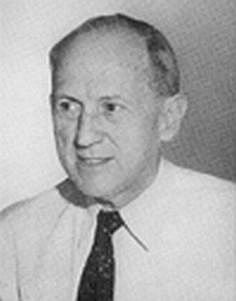"Paleotological Botany"(名][U]古生物学;[C]古生物誌.
使此學流傳東方
Chaney, Ralph Works (United States 1890-1971)
| Chaney's University of California: In Memoriam obituary notes that his "most significant contribution to paleobotany was to consider fossil plants as members of forest associations and not as isolated morphologic entities. Thus he was the first to adopt an ecological approach to the description and analysis of Tertiary floras in western North America, and to apply it over a much larger geographic area adjacent to the Pacific basin. His quantitative studies of the relationships between the accumulations of recent leaves in stream pools and the surrounding vegetation provided a technique whereby objective inferences concerning past vegetation could be derived from the statistical analysis of leaves and other organs in fossil floras." Chaney's approach required the sifting of large amounts of data, and he traveled widely--both within Western America, and to Central and South America, Mongolia, Japan, Korea, and China. Among Chaney's innovations was his depiction of the "geoflora," a large scale dispersal of forms in time and space (for example, in response to permanent climatic shifts). One odd outcome of his work on paleofaunas and systematics was his interest in the Chinese redwood genus Metasequoia, and by extension Californian forms: late in life he became a leading advocate for their conservation. |
Life Chronology
--born in Brainerd, Illinois, on 24 August 1890.
--1912: B.S. in geology, University of Chicago
--1914-1917: teaches science at the Francis W. Parker School in Chicago
--1917-1922: teaches geology at the University of Iowa
--1919: Ph.D. in geology, University of Chicago
--1922: made research associate at the Carnegie Institution of Washington
--1925: accompanies Roy Chapman Andrews' paleontological expedition to the Gobi Desert, Mongolia
--1931: named professor of paleobotany and chair of the paleontology department at the University of California, Berkeley
--1939: president, Paleontological Society of America
--1940: vice-president, Geological Society of America
--1943-1945: assistant director, Lawrence Radiation Laboratory
--1943-1954: serves on the National Park Service's Advisory Board
--1944: honorary D.Sc., University of Oregon
--1947: elected to the National Academy of Sciences
--1947: publishes "Tertiary Centers and Migration Routes" in Ecological Monographs
--1957: retires from the Carnegie Institution
--1961-1971: president, Save-the-Redwoods League
--1969: honorary vice-president, Eleventh International Botanical Congress
--1970: receives the Paleontological Society Medal
--dies at Berkeley, California, on 3 March 1971.
For Additional Information, See:
--Biographical Memoirs, National Academy of Sciences (U.S.A.), Vol. 55 (1985).
--Dictionary of Scientific Biography, Vol. 17 (1990).
--Year Book of the American Philosophical Society for 1971 (1972): 115-120.
--Memorials, The Geological Society of America, Vol. 3 (1974): 60-68.

沒有留言:
張貼留言